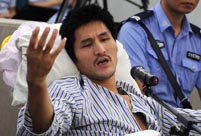Failure to give urban citizenship to rustics who leave their rural homes has drawbacks, including issues of unfair treatment, loss of arable land and the piling up of local government debts, said Kuang Xianming, director of economic research at the China Institute for Reform and Development.
Each year, millions of people from the countryside come to work in China' s big cities, often in low-paid manual work, but lack access to education, health and other services tied to the strict "hukou" household registration system.
The migrant workers only earned an average 7,019 yuan in net income last year, compared to 24,565 yuan of the average urban workers' salary. Despite the pitiful earnings, migrant workers often save much of the money.
"Some local governments are good at economic construction. But they have no idea how to push urbanization required by the central government, to focus more on promoting equal public services, city planning and low-carbon technology needed to support green urban development," Zhuang said.
And some local heads intentionally repeat their "constructing cities" campaign because the emphasis on improving public services and conservation-oriented urbanization will further squeeze the cash-strapped local finance.
Due to a disproportional distribution of fiscal income between central and local governments, local finance largely relies on revenue from sale of land, mostly for real estate development.
The sheer focus on construction of real estate has created uninhabited cities across the nation. Erdos City in Inner Mongolia Autonomous Region has been put under the microscope for its sparse residential communities.
Experts believed that reform of the government itself, such as changes in government functions and official assessment mechanisms, will play a vital role in keeping the urbanization drive on track.
"Whether the government will succeed in the so-called new urbanization depends on a string of institutional reforms such as the hukou system and fiscal policies. Most of all, it needs to change the traditional economic growth pattern," Kuang said.
Past years have seen the formation of a government-dominated and investment-led city development, but this should give way to a model that features the market and demand, said Kuang.
Zhuang shares his views. He added that the system that evaluates local government should be rebuilt to include more non-economic indicators such as education, social security and environmental protection.
"The government can make plans and offer guidance, but should refrain from interfering in the process of urbanization," he said.

 Pakistan suffers desperate shortage of water
Pakistan suffers desperate shortage of water Lanzhou MAC conducts actual-troop live-ammunition drill
Lanzhou MAC conducts actual-troop live-ammunition drill Heritage train ride across western Kosovo
Heritage train ride across western Kosovo Baby girl 'too young' for birthmarks treatment
Baby girl 'too young' for birthmarks treatment Beijing court hears airport blast case
Beijing court hears airport blast case Harbin named Chinese city with most beautiful women
Harbin named Chinese city with most beautiful women Wushu spirit
Wushu spirit Rugby girls
Rugby girls Funniest photos of sport stars as kids
Funniest photos of sport stars as kids  Residences of the royal house of Savoy
Residences of the royal house of Savoy China's frigate 'Bengbu'in fire training
China's frigate 'Bengbu'in fire training The last days of Wan Aihua
The last days of Wan Aihua Highlights at 12th National Games of China
Highlights at 12th National Games of China Beijing Film Academy welcomes freshmen
Beijing Film Academy welcomes freshmen 2013 Taiwan Int'l Tourism Expo kicks off in Taipei
2013 Taiwan Int'l Tourism Expo kicks off in TaipeiDay|Week|Month